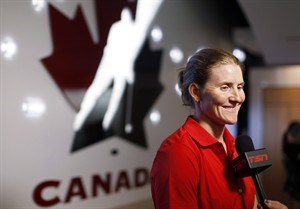
Canadian National Women's hockey player Hayley Wickenheiser, from Shaunavon, Sask., speaks to a reporter a news conference in Calgary, Alta., Monday, May 27, 2013. The team is heading to Penticton, B.C., for a month-long boot camp.THE CANADIAN PRESS/Jeff McIntosh
May 27, 2013 - 3:33 PM
CALGARY - Jenelle Kohanchuk wondered if she would really need bear spray. Caroline Ouellette armed herself with swimming lessons.
The 27 Canadians chosen to try out for the 2014 Olympic women's hockey team departed Monday for Penticton, B.C., where they will be pushed to their breaking points at a three-week boot camp.
The 16 who have already experienced pre-Olympic boot camps know their physical and mental limits will be tested not just by the unusual activities planned for them, but also by the sheer volume of them.
The rest, like Winnipeg's Kohanchuk, are about to find out what the veterans know.
"They've scared me, but at the same time, they're preparing me," the 23-year-old forward said. "They just said that I'm going to be exhausted and sometimes I might get left in the woods, but I think they're just trying to scare me.
"I am kind of nervous because you need to bring bear spray. I just hope it's not actually like that. I'm excited at the same time, but nervous because I don't want anything bad to happen."
Head coach Dan Church and assistants Lisa Haley and Danielle Goyette haven't yet told the players what is in store for them in Penticton.
Boot camp has become a standard part of the women's Olympic preparation since they held one in Valcartier, Que., prior to the 2002 Games. Their boot camp for 2006 was in Prince Edward Island.
"This is where we set the stage for everything to happen in the next 10 months," said Kalli Quinn, Hockey Canada's director of female hockey.
"The team building, setting the standard of where we need to be as a group, working on the on-ice and off-ice athletic development is what we're doing."
Prior to the 2010 Winter Olympics in Vancouver, camp was in Dawson Creek, B.C. Their days started with a run at dawn and often didn't end until 8 p.m.
In addition to the usual skating and weight training sessions, they rock climbed, kickboxed, ran and rode their bikes through mountainous bear territory. For those who couldn't swim, racing a triathlon was terrifying and tortuous.
"Swimming is just so not natural for me," said Ouellette, a three-time Olympian. "I took a lesson this year because I honestly was one of the worst on the team and people made fun of me. I totally stink and I didn't want to be that person."
Towards the end of the Dawson Creek boot camp, they rode their bikes 35 kilometres into the mountains, hiked up one and back down before making the return trip on their bikes.
It's not one activity, but the accumulation of them that pushes a player to the emotional and physical brink, says Tessa Bonhomme. The defenceman from Sudbury, Ont., recalled biking kilometres uphill with her teammates into a wilderness area near Dawson Creek.
They slept on hard planks that night and used a bucket for a toilet. No one wanted to go outside at night because of bears.
Sleep-deprived, she and Gillian Apps were quickly trying to clean the dining hall floor the next morning while their teammates prepared to ride. They spilled the pail with dirty water. On her bike and riding uphill once again, Bonhomme lost it.
"I remember biking behind Jennifer Botterill trying to draft behind her and starting to cry," Bonhomme said. "She, of course, looked back and saw me and laughed. She carried me along.
"You don't even know why you're freaking out. You just get pushed to that point where you've had enough mentally and physically. You need to shed a couple of tears."
There is a point to boot camp and it's not cruelty, according to Haley.
"That's definitely not the purpose, to be cruel in any way," the assistant coach said. "What we really want to see them do is get to that limit and see if they can push that extra little bit beyond it."
The players were in Calgary for physical testing prior to heading for Penticton. They'll live three to six per home in private houses Hockey Canada has rented in the Okanagan city.
When camp ends June 19, they'll go their respective home towns before returning to Calgary in August. They'll then spend six months training and playing approximately 60 games in preparation for the Winter Games in Sochi, Russia.
Six players will be released before Church names his 21-player team in late December.
Boot camp is more than building individual toughness, says captain Hayley Wickenheiser. It also builds trust between teammates.
"You get to see people, teammates in their every day life under fatigue and adversity and that's really when the true character and personalities come out," the five-time Olympian explained.
"We get to know each other a lot better on a different level. You also have a chance to not only steel your body, but steel your mind through some of the days when you just want to stay in bed and you don't want to get up. You do because you don't want to let anybody down."
Wickenheiser has been rehabilitating a knee and related back injury since Canada took a silver medal at last month's world championship in Ottawa. She says boot camp will test how well that rehabilitation has gone.
Ouellette says what the players will endure in Penticton will make the other challenges en route to Sochi easier to overcome.
"It is so demanding, but when you go through boot camp, everything looks easier after," she said.
News from © The Canadian Press, 2013